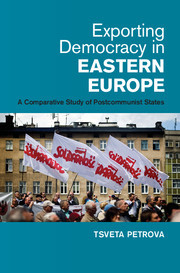Description
From Solidarity to Geopolitics
Support for Democracy among Postcommunist States
Author: Petrova Tsveta
This book theorizes a mechanism underlying regime-change waves, the deliberate efforts of diffusion entrepreneurs to spread a particular regime and regime-change model across state borders.
Language: English
Subject for From Solidarity to Geopolitics:
Approximative price 78.50 €
In Print (Delivery period: 14 days).
Add to cart
Publication date: 09-2014
232 p. · 15.6x23.5 cm · Hardback
232 p. · 15.6x23.5 cm · Hardback
Description
/li>Contents
/li>Biography
/li>
This book theorizes a mechanism underlying regime-change waves, the deliberate efforts of diffusion entrepreneurs to spread a particular regime and regime-change model across state borders. Why do only certain states and non-state actors emerge as such entrepreneurs? Why, how, and how effectively do they support regime change abroad? To answer these questions, the book studies the entrepreneurs behind the third wave of democratization, with a focus on the new eastern European democracies - members of the European Union. The study finds that it is not the strongest democracies nor the democracies trying to ensure their survival in a neighborhood of non-democracies that become the most active diffusion entrepreneurs. It is, instead, the countries where the organizers of the domestic democratic transitions build strong solidarity movements supporting the spread of democracy abroad that do. The book also draws parallels between their activism abroad and their experiences with democratization and democracy assistance at home.
1. Regime-change waves and eastern EU democracy promotion; 2. Exporting the revolution: why only some eastern EU new democracies support democratization abroad; 3. From solidarity to survival: the motivations behind eastern EU civic democracy promotion; 4. An improved domestic and international order?: The rationales behind eastern EU official democracy promotion; 5. A new generation of democracy promoters?: Eastern EU approaches to democracy promotion; 6. Conclusion: making a difference?
Tsveta Petrova received her PhD in political science from Cornell University in 2011 and then completed postdoctoral fellowships at Harvard University's Davis Center and Columbia University's Harriman Institute. Petrova is the recipient of research awards from the Association for Women in Slavic Studies and the Johnson Institute for Responsible Leadership at the University of Pittsburgh. She has also earned many fellowships and grants from organizations including the Social Science Research Council, the American Council of Learned Societies, the National Council for Eurasian and East European Research, the Woodrow Wilson Center for International Scholars, IREX, the National Endowment for Democracy, the Smith Richardson Foundation, and the Council for European Studies. Her work has been published in Comparative Political Studies, the Journal of Democracy, and the Review of International Affairs.
© 2024 LAVOISIER S.A.S.




